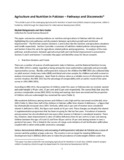| dc.contributor.author | Balagamwala, Mysbah | |
| dc.contributor.author | Gazdar, Haris | |
| dc.coverage.spatial | Pakistan | en |
| dc.date.accessioned | 2016-08-12T15:29:29Z | |
| dc.date.available | 2016-08-12T15:29:29Z | |
| dc.date.issued | 2013-05 | |
| dc.identifier.citation | Balagamwala, M. and Gazdar, H. (2013) Agriculture and nutrition in Pakistan: pathways and disconnects. Brighton: LANSA. | en |
| dc.identifier.uri | https://opendocs.ids.ac.uk/opendocs/handle/20.500.12413/12147 | |
| dc.description | LANSA is funded by UKAid through the Department for International Development (DFID). | en |
| dc.description.abstract | This paper analyses the pathways and disconnects between agriculture and nutrition in the context of Pakistan, using a framework developed by theTackling the Agriculture-Nutrition Disconnect in India (TANDI) research programme. The pathways identified are: agriculture as a source of food; agriculture as a source of income; supply and demand factors in agriculture that impact household food security; non-food expenditure of income derived from agriculture; and, role of gender through female employment in agriculture and its impact on intra-household allocations, care practices and women's own energy expenditure.
The analysis highlights the importance of moving beyond understanding agriculture as a source of food for farm households, and examines the trade-off between self-consumption and the market price of food. The study shows that in Pakistan:
the price of most food is not determined by local supply and demand conditions, but by global markets
an increase in agricultural income from cash crops, such as cotton, does not necessarily lead to increase in consumption of own-produced food. Cash crops often leave less room for food crops
some regions with the worst nutritional outcomes are those where the agricultural economy is doing relatively well. In such areas, demand for women's labour is often high, which can have both positive and negative effects on nutritional outcomes.
These findings have important policy implications and the TANDI framework is a useful starting point to understand the agriculture-nutrition link in Pakistan. However, the authors establish that assessing progress along any particular pathway between agriculture and nutrition reveals that there are a wide range of intervening processes and conditions, which require further investigation:
Agricultural growth may benefit those households which have access to land, but it may be the landless or land-poor that are the most nutritionally deprived. There is a clear hierarchy between farmers and labourers in terms of income, food security, nutritional outcomes.
Patriarchy and unequal gender relations influence social policy and norms which adversely affects maternal health practices, women's empowerment and intra-household allocations of food.
Behaviour and preferences of households and individuals over matters concerning food consumption, dietary diversity, and care practices have an influence over agriculture's ability to address undernutrition.
Political priorities and organisational effectiveness.
The authors conclude that a research agenda that addresses these gaps can play a strategic role in addressing agriculture-nutrition disconnects and improve nutritional outcomes. Existing programmes and policies, such as cash transfer programmes and land grant schemes, that address themes in gender relations and access to land provide opportunities for grounded empirical and policy research.
[adapted from summary written by S. Zuberi, from CSSR Pakistan] | en |
| dc.description.sponsorship | UK Aid | en |
| dc.description.sponsorship | Department for International Development (DFID) | en |
| dc.language.iso | en | en |
| dc.publisher | Leveraging Agriculture for Nutrition in South Asia (LANSA) | en |
| dc.rights.uri | http://creativecommons.org/licenses/by-nc-nd/4.0/ | en |
| dc.subject | Agriculture | en |
| dc.subject | Health | en |
| dc.subject | Nutrition | en |
| dc.title | Agriculture and nutrition in Pakistan: pathways and disconnects | en |
| dc.type | Series paper (non-IDS) | en |
| dc.rights.holder | ©Leveraging Agriculture for Nutrition in South Asia (LANSA) | en |
| dcterms.dateAccepted | 2012-05 | |
| rioxxterms.funder | Department for International Development, UK Government | |
| rioxxterms.identifier.project | LANSA | |
| rioxxterms.version | NA | en |
| rioxxterms.funder.project | 752f8189-3789-4438-be29-585edbe66660 | |


